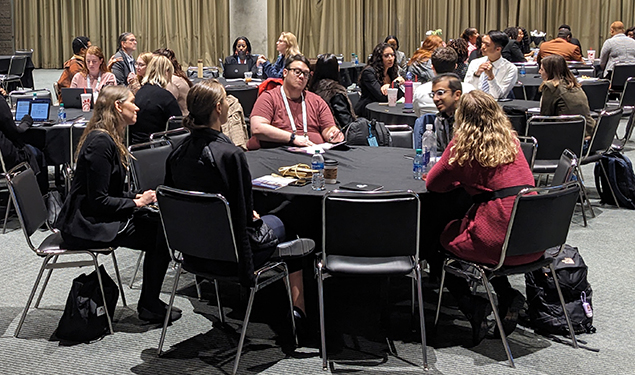As the 2023 APHA Annual Meeting and Expo began on Saturday, the association’s Student Assembly got a glimpse into the future of public health, specifically “One Health.”
One Health is a concept that recognizes that the health of humans, animals and our environment are linked. This can lead to a more holistic approach to public health, and disease prevention and response.
According to Colin Basler, deputy director of the Centers for Disease Control and Prevention’s One Health office, the idea of One Health is becoming more important as people are living closer together, global travel and trade increases and climate change accelerates.
“No single person, organization or sector can advance One Health alone,” Basler said, adding that the CDC’s One Health office works across many disciplines and sectors.
 One of the biggest recent examples of One Health in action was the creation of the One Health Federal Interagency COVID-19 Coordination Group, which brought together CDC and 23 federal agencies to study the transmission of COVID-19 from person to person, from animal to animal, and from animals to humans. Basler said the group also studied the economic impacts the emerging virus could have on industry, agriculture and the health care system.
One of the biggest recent examples of One Health in action was the creation of the One Health Federal Interagency COVID-19 Coordination Group, which brought together CDC and 23 federal agencies to study the transmission of COVID-19 from person to person, from animal to animal, and from animals to humans. Basler said the group also studied the economic impacts the emerging virus could have on industry, agriculture and the health care system.
Andrea Perkins, with the College of Veterinary Medicine at Auburn University, said the economic burden of a disease outbreak — whether in a hospital for humans or for animals — is significant. According to Perkins, an outbreak can total $28.4 billion per year in direct health care costs, in addition to a $12 billion cost to society from people missing work. In veterinary medicine, the costs of an outbreak are roughly $4.12 million, but if the disease is transmitted to humans, it could lead to much greater loss.
Catherine Machalaba said interdisciplinary partnerships are important to One Health due to increasing environmental health risks. “We are experiencing a threefold planetary crisis,” she said. “We’re facing climate change, more pollution and biodiversity loss.”
Machalaba has worked in Liberia to prevent and control the spread of fever by determining its cause, whether viral or zoonotic. Public outreach in Liberia included information about bats, which are beneficial to the ecosystem but can present health hazards to humans.
The “One World, One Health” presentation was only about an hour of the Student Assembly’s all-day meeting. Student attendees said it was beneficial as they begin their student-focused day — and their public health careers.
“A lot of the focus of the Student Assembly is thinking about ‘how are we, as the next generation of public health leaders, thinking differently and more innovatively about public health and what will truly being important to in our future?” said Lauren Ray, a third-year medical student at the University of the Incarnate Word in San Antonio, Texas. “Everything is pointing us to thinking from a One Health holistic framework, so we thought it would be important to incorporate [the concept] earlier in public health careers so students are thinking about having a One Health perspective early on in their careers.”
Photo by Mary Stortstrom.